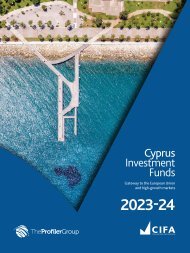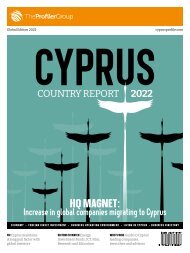2020 Cyprus Country Report
The 2020 Cyprus Country Report features in-depth articles on the economy, foreign direct investment, international trade and headquartering as well as detailed sector profiles and insights from Cyprus’ 100 most influential political, economic and business leaders shaping the future of their country and its industries.
The 2020 Cyprus Country Report features in-depth articles on the economy, foreign direct investment, international trade and headquartering as well as detailed sector profiles and insights from Cyprus’ 100 most influential political, economic and business leaders shaping the future of their country and its industries.
You also want an ePaper? Increase the reach of your titles
YUMPU automatically turns print PDFs into web optimized ePapers that Google loves.
A NEW VISION<br />
The backbone of the new industrial revolution<br />
<strong>Cyprus</strong> is embarking on is the gradual implementation<br />
of a new National Industrial Strategy<br />
Policy for 2019-2030. Together with the private<br />
sector, the Ministry of Energy, Commerce and<br />
Industry (MECI) has finalised the new strategy,<br />
which highlights digital transformation and<br />
envisions so-called smart factories increasingly<br />
powered by renewable energy producing high<br />
value-added and ‘green’ products – a principle<br />
already embraced by <strong>Cyprus</strong>’ leading manufacturers<br />
to compete globally. A key objective<br />
is also to improve access to finance and key<br />
export markets. There are already incentives in<br />
place for investments in fixed assets and industrial<br />
equipment, while innovation projects in<br />
manufacturing are supported by state funding<br />
to promote results-oriented research.<br />
Other incentives to boost the sector include<br />
a fast-track visa programme for start-up entrepreneurs<br />
from outside the EU to establish<br />
ventures with high growth potential, which will<br />
be in force until 2021. The establishment of the<br />
Deputy Ministry of Research, Innovation and<br />
Digital Policy, which has underlined the government’s<br />
recognition of research and innovation as<br />
a fundamental pillar of a new model for growth,<br />
will also help cut government bureaucracy and<br />
attract foreign direct investment in high-tech<br />
and knowledge-based industries.<br />
CORONVIRUS IMPACT<br />
Although <strong>Cyprus</strong>’ new long-term vision for the<br />
sector is full of promise, there is no doubt the<br />
coronavirus pandemic has taken its toll on the industry<br />
both in <strong>Cyprus</strong> and globally. The considerable<br />
repercussions of the crisis on normally topperforming<br />
sectors like tourism, where revenues<br />
have plummeted in <strong>2020</strong>, has had a significant<br />
knock-on effect on other sectors such as manufacturing<br />
and industry.<br />
The manufacturing sector marked a decline of<br />
19.6% in May <strong>2020</strong> compared to May 2019 and<br />
compared to an annual reduction of 32.6% in<br />
April. The contribution to GDP from manufacturing<br />
in <strong>Cyprus</strong> decreased to €223.85 million in<br />
the second quarter of <strong>2020</strong> from €240.43 million<br />
in the first quarter of <strong>2020</strong>. The contribution<br />
to GDP from manufacturing in <strong>Cyprus</strong> averaged<br />
€243.65 million from 1995 until <strong>2020</strong>.<br />
<strong>Cyprus</strong>’ Industrial Turnover Index fell by<br />
almost 20% in May <strong>2020</strong> compared to May 2019,<br />
affected by measures to curb the spread of the<br />
pandemic. However, the index marked a steady<br />
improvement as containment measures were<br />
gradually lifted.<br />
By promptly taking<br />
decisive measures<br />
to tackle the Covid-19<br />
pandemic, the government<br />
of the Republic of <strong>Cyprus</strong><br />
has protected public health,<br />
ensuring that the island<br />
remains a relatively safe<br />
destination for travel and,<br />
importantly, minimising<br />
the adverse impact on the<br />
country’s economy. The<br />
initial implementation<br />
of a comprehensive, €3<br />
billion, Economy Support<br />
Programme, is backed by<br />
efforts to further improve<br />
the conditions that make<br />
<strong>Cyprus</strong> an attractive<br />
investment and business<br />
jurisdiction. At the Ministry<br />
of Energy, Commerce and<br />
Industry we are introducing<br />
significant funding schemes<br />
in 2021 and implementing<br />
our new National Industrial<br />
Policy 2030, which aims to<br />
modernise the industrial<br />
sector through digitisation,<br />
skills development,<br />
improvement of the<br />
business environment and<br />
enhancement of access to<br />
finance and markets. To<br />
support businesses setting<br />
up or scaling in <strong>Cyprus</strong>, we<br />
are also planning to create a<br />
dedicated business service<br />
centre at our Ministry,<br />
tasked with facilitating<br />
licensing procedures and<br />
providing personalised<br />
guidance and advice.<br />
Natasa Pilides<br />
Minister of Energy,<br />
Commerce and Industry<br />
KEY PRODUCTS<br />
<strong>Cyprus</strong> embraced industrial development in the<br />
decade after independence in 1960, transforming<br />
the largely agricultural country into one where<br />
manufacturing accounted for 20% of GDP by<br />
the 1980s. An early success came in 1967 when<br />
a Cypriot company, Photos Photiades Breweries,<br />
secured a licence to brew Carlsberg, which is now<br />
done at a fully-automated brewery in Nicosia.<br />
It was the first time the Danish brewing giant<br />
allowed its famous beer to be produced outside<br />
Denmark. Further transformation produced<br />
an increasingly services-oriented economy. The<br />
once flourishing but protected textile, clothing<br />
and footwear industries faded after EU membership<br />
in 2004, giving rise to the manufacture<br />
of medium- and high-technology products and<br />
semi-customised small-batch products.<br />
The main growth areas have been in the ICT<br />
sector, manufacturing parts, instruments and<br />
electronics, as well as consumer products such<br />
as cosmetics. Production of pharmaceuticals,<br />
cement and fabricated metal items – all wellestablished<br />
export industries – is performing<br />
strongly.<br />
Industrial production contracted sharply<br />
following the 2013 banking crisis, but the traditionally<br />
resilient sector recovered faster than the<br />
general economy. Some 30,000 people – about<br />
6% of the workforce – are employed in manufacturing<br />
and industry. The main destination for<br />
Cypriot manufactured exports is the European<br />
Union, which constitutes over 50% of the market,<br />
while exports to the Middle East make up around<br />
15%.<br />
SMES LEADING THE WAY<br />
The clear majority of <strong>Cyprus</strong>’ over 5,000 manufacturers<br />
are small and medium-sized enterprises<br />
(SMEs), mostly family-owned and run. This<br />
makes the sector flexible and open to innovation,<br />
offsetting difficulties with economies of scale<br />
which will also be addressed by plans for clustering<br />
and improving the industrial infrastructure.<br />
The new national industrial strategy policy will<br />
encourage more private investment in research<br />
and innovation and capitalise on robust spending<br />
in this area by <strong>Cyprus</strong>’ public universities by<br />
improving synergies between academia and industry.<br />
<strong>Cyprus</strong> also ranks first per capita among EU<br />
members competing for funds from Europe’s<br />
largest research and innovation programme,<br />
Horizon <strong>2020</strong>. Acquiring such funds has helped<br />
innovative Cypriot SMEs to become notable successes.<br />
One of these is Vitatrace Nutrition Ltd<br />
(VTN), which employs some 40 people at its<br />
Sector Profile<br />
<strong>Country</strong> <strong>Report</strong> CYPRUS <strong>2020</strong> 113

















